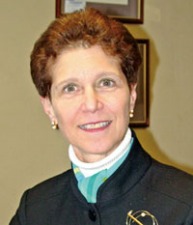Uniquely Certified

Carol Katz, is the CEO of Loomis Communities
By Carol Katz
In 1987, the Omnibus Budget Reconciliation Act (OBRA) was instituted to help insure that long term care facilities seeking Medicare or Medicaid funding provided services so that each resident could "attain and maintain [their] highest practicable physical, mental, and psycho-social well-being." OBRA included a number of then-new provisions including requiring these facilities to place an emphasis on "a resident's quality of life as well as the quality of care."
In the past ten years, changes in regulations, an increased focus on resident-centered care, improvements in technology, and a pioneering movement called "culture change" all are contributing to a sea change in what life is like in a nursing home today.
Nowhere is this more evident than at the Loomis House Nursing Center, where for the past eight years staff, residents and their families have been on a journey to change the culture of their facility. In March, Loomis House demonstrated its commitment to its residents by becoming accredited as a Person Centered Long Term Care Community. This accreditation from Commission on Accreditation of Rehabilitation Facilities (CARF) makes Loomis House only the second nursing home in the United States to successfully complete the five-year accreditation.
To receive the accreditation, Loomis House had to demonstrate that it fosters a culture that supports autonomy, diversity, and individual choice. The accreditation process also required the nursing home to commit to responsiveness, spontaneity, and continuous learning and growth. Residents participate in decisions about the rhythm of their day, the services provided to them and the issues that are important to them. Their families are partners with them and with our staff.
Loomis House had already been accredited through the Continuing Care Accreditation Commission (CCAC) when it merged with CARF, according to Lori Todd, the administrator at Loomis House in Holyoke.
"We were up for our regular accreditation. CARF-CCAC had just finished the standards for what is called Person Centered Long Term Care and because we have been involved in the culture change movement for the past eight years, it made perfect sense for us to pursue the accreditation in this area," she said.
CARF-CCAC assigned a surveyor to the facility who worked with the administration and staff throughout the accreditation process.
The organization surveyed Loomis' accordance with First Incentive Long Term Care Community Standards, which included how leadership encouraged spontaneity, the types of relationship building activities they provided, the choices and timing of services, a resident's voice in decorating his or her room, and involvement in the community.
The tenet of the OBRA regulations regarding long term care has not changed.
"What's changed really is the interpretation of the regulations," says Todd. She notes that at the state level waivers on the regulations are being allowed a little more freely. She cited the example resident dining.
"There are regulations about the timing of when residents have to be fed," she said. "They cannot go more than 15 hours without food so, for example, they are offered snacks in the evening. Many nursing homes now are applying for and receiving waivers [allowing them to] open up their dining areas so that if a resident does not get up at eight o'clock in the morning, the facility can extend the dining time to ten o'clock."
Loomis House also addressed contemporary issues such as Internet access, personal computers, access to media, etc.
"We were cited in the best practices because we have an intergenerational mentoring program which won an award from the Massachusetts Aging Services Association," said Todd.
Students from Blessed Sacrament School in Holyoke are transported to Loomis House to work with the residents in a curriculum-based program. The residents also attend events at the school.
"In October we will have a software program called 'It's Never Too Late' where the students, residents and residents' families can participate in a virtual classroom," she said
Loomis House has also received a series of matching grants from the state as part of the Extended Care Career Ladder Initiative (ECCLI) for educating their line staff and providing them with education and career ladders. "Our certified nursing assistants (CNAs), because of the grant and a commitment from the administration, could go through a career ladder and earn more money and also [gain] more expertise in their profession," said Todd. "There are also career ladders that go from CNA, to LPN to RN."
The same career ladders are available to food service staff and environment service staff.
The five-year accreditation is an ongoing process and Loomis House must assure CARF-CCAC that they are in compliance. They regularly submit quality improvement information to the Commission.
"The five year accreditation means that they really trust that you are doing good job, which are huge kudos for us," said Todd.
"What [the accreditation] does is make you have a commitment to the quality that you are practicing because you have to continue to meet the standards," she added. "It has been an enormous culture change because it makes us focus on our practices and make certain that the decisions are as close to the resident as possible. It makes us look at all of our operations on a continual basis."
Carol Katz is the CEO of Loomis Communities
Photo: Carol Katz
Photo: Loomis House
Pull Quote/Side Bar: A pioneering movement called "culture change" is contributing to a sea change in nursing home life.
